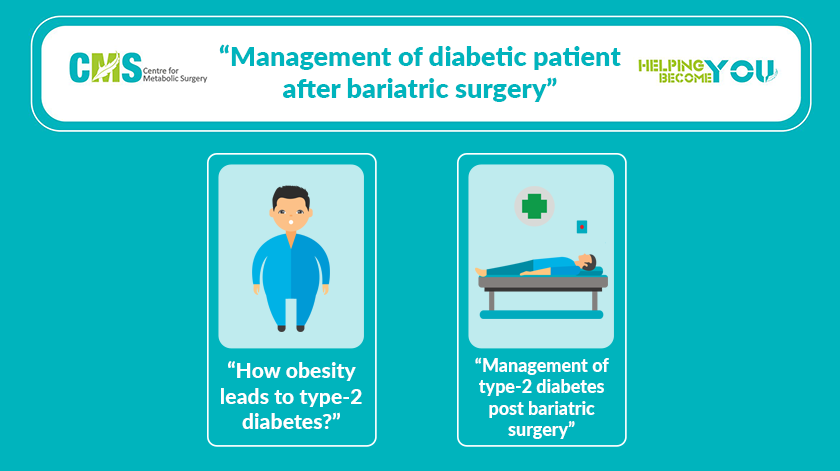
World Health Organization in a report states, that though the main causes of diabetes remain complex to explain, it is seen that obesity is a major contributor to this epidemic. Some of the measurable risk factors include high Body Mass Index (BMI) and high waist circumference.[1]
How obesity leads to type-2 diabetes?
Many studies have confirmed the relationship between type-2 diabetes (T2D) and obesity. Two important factors that influence the development of T2D in obese patients are:
- Inflammatory Response- abdominal fat causes the release of certain inflammatory chemicals, which reduces the body’s sensitivity towards insulin. This process is called insulin resistance which is a major factor in the development of type-2 diabetes.[1]
- Disruption in fat metabolism- obesity also is believed to bring changes in body’s metabolism. These changes can trigger the release of fat molecules into the blood. These fat molecules increase insulin resistance at cell levels.[2]
Management of type-2 diabetes post bariatric surgery
Type-2 diabetes management requires a multi-disciplinary approach, which involves lifestyle changes, medications, and weight management. As there are hormonal association between obesity and type-2 diabetes, it is obvious that the treatment methods for obesity, like weight loss surgery, will have an impact on it too.
Bariatric surgery is now considered a definite treatment option for type 2 diabetes. In most obese diabetics, bariatric surgery is offered at an early stage to avoid pancreatic damage. While in slim diabetics, surgery is considered if blood sugars remain uncontrolled with medicines. I wish to share some tips for management of such post bariatric diabetic patients –
Tablets for T2D treatment: In an immediate post-surgery period, regular checkup of blood sugar is required. Most of the time diabetes medicines are not prescribed to avoid as the risk of hypoglycemia. However, if sugar levels are consistently high then, Metformin is prescribed to most patients, unless they are intolerant to it. It is advisable to contact your doctor[1] if sugar levels are above 180 mgs or below 120 on fasting state.
Insulin injections for T2D treatment: in most patient insulin injections are stopped within 2-3 days after surgery. In other’s the dose of insulin is reduced significantly and it is advisable to keep in touch with your doctor if blood-sugar levels are not in normal range.[1]
Avoiding high glycemic food: Please remember that your sugar levels may rise if you consume foods like refined flour, white rice, sweets and sugars. You should be able to maintain your blood sugar levels with good dietary control for years after surgery.
Regular exercises: This probably is the single most important intervention to help maintain sugars without medicines after surgery. Muscle helps stabilize blood sugar levels by reducing insulin resistance.
Remember you are diabetic: Even though your sugar levels are normal for years after surgery, they can increase in presence of infection anywhere in the body. Please tell your treating doctor about your diabetes and bariatric surgery and get blood sugar checked early. Please don’t resist If your doctor starts diabetes tablets/insulin till infection gets controlled.
References:

Post a comment
Your email address will not be published. Fields marked (*) are mandatory.